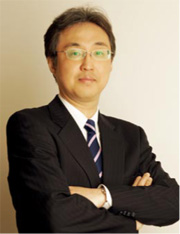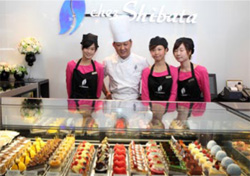Home > Highlighting JAPAN > Highlighting Japan FEBRUARY 2012 > "Time Machine Business" in Asia and Beyond
Highlighting JAPAN
COVER STORY: At Your Service
"Time Machine Business" in Asia and Beyond
More and more Japanese companies in the service industry have started operations overseas. The Japan Journal's Osamu Sawaji spoke with Hironobu Kitagawa, director of the service industry support division at JETRO (Japan External Trade Organization), about this trend.

Hironobu Kitagawa, director of the service industry support division at JETRO
In recent years, a growing number of Japanese companies in the service industry have been expanding overseas, mainly in Asia. What is the reason for this?
Hironobu Kitagawa: One of the major reasons is that economic development in Asia has resulted in improved living standards. When people are more comfortably off, it is natural that they want to be more fashionable, eat better-tasting food, or educate their children differently from other people. Japanese companies in the service industry are responding to those needs.
The globalization of the service industry may be called the expansion of "time machine business." Time machine business is the business of providing developing countries with services that have succeeded in developed countries such as the United States and Japan, based on the metaphor that if we take a business that is currently fashionable and travel back in a time machine, it will be a sure success. McDonald's started its business in Japan in the early 1970s; it achieved success after increasing the number of its shops in the United States in the 1950s. This is an example of time machine business. Many Japanese companies in the service industry are now carrying out time machine business in Asia.
Amidst the expansion of Japan's service industry, we were very worried about harmful rumors circulating abroad after the Great East Japan Earthquake, and especially their impact on Japanese restaurants. Fortunately, the effect was minimal, and I believe this reflected the high level of trust Japan commands.
In recent years, what trends have there been in companies in the service industry that operate overseas?
I have interviewed more than 300 managers of companies that operate overseas, and one of the key characteristics is the expansion of small and medium enterprises or local firms into Asia. This is because they wish to incorporate into their own companies the vitality of Asia, whose economy is expected to see further growth in the future as the population increases. This trend is supported by the ease with which it is now possible to fly to cities in Asia from Japan's regional airports, making it possible for managers to actually see the cities and the local people for themselves to assess the potential of a particular city.

P佁Eissier Takeshi Shibata (center) with staff at the Hong Kong branch of chez Shibata
Credit: COURTESY OF CHEZ SHIBATA
What kind of Japanese small and medium enterprises are expanding overseas?
One example is Mi-Ne Sushi from Kumamoto Prefecture. Mi-Ne Sushi has only four branches in Kumamoto, but operates seven sushi bars in Hong Kong, which are so popular that there are long lines to get in. The reason for its success is that it caters to the needs of the locals who wish to eat authentic Japanese sushi by importing ingredients from Japan, having staff call out greetings to customers in Japanese, or having the chefs actually making the sushi in view.
Another example is chez Shibata, which sells cakes, chocolates and other western confectionery in its four branches in Aichi Prefecture and has opened branches in Shanghai and Hong Kong. Since China does not yet have many shops where you can eat genuine western confectionery, chez Shibata has acquired a local reputation as a shop with a sophisticated ambience where very tasty high-quality western confectionery can be purchased.
The apparel maker Honeys headquartered in Iwaki, Fukushima Prefecture runs over 800 women's casual fashion stores in Japan and operates more than 300 stores in China. The reasons for its popularity are its wide product range incorporating the latest Japanese fashions, as well as its reasonable prices.
What role does JETRO play in the expansion of Japanese companies overseas?
One example is the mission to support the overseas expansion of Japanese companies. In March, we are dispatching a delegation to Ho Chi Minh City in Vietnam comprising Japanese companies in the hairdressing, restaurant and education service industries. Delegates will attend investment climate seminars, observe local commercial establishments, and participate in networking events with local companies.
The expansion overseas of Japanese companies in the service industry is a win-win policy for both Japan and the host country, creating employment and resulting in improved living standards for the local people.
© 2009 Cabinet Office, Government of Japan






